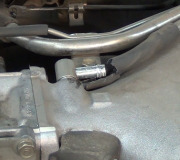Many years ago I had a Dodge Dart with a 340 c.I. That I raced. It had a badly burned valve that I later found to be about one-fifth missing, (burned away). It did sound like an air compressor at idle, but it had all kinds of power. You can have valves that are leaking far less than mine was, but you have to remember, my idle speed was controlled with an adjustable screw. Yours is controlled with a computer that is expecting to see a steady vacuum reading at idle. Leaking valves will cause a reduction in vacuum and idle speed, then the computer will try to correct the idle speed while including that unknown variable in the fuel metering calculations. The electronic controls and the mechanical characteristics of the engine are fighting each other instead of working together. Most of the time the engine will not start or run with bent valves, but that depends on how much the timing belt jumped. You do not have to worry when it jumps one or two teeth, but there are some engines that cannot tolerate it jumping three teeth. If your timing belt broke while the engine was running, it is almost a certainty there are bent valves. (I have to add that my source has been wrong on at least one occasion. They list the 3.0L in my 1988 Grand Caravan as an interference engine, and I know it is not).
Sometimes you can get an idea of the condition of the valves by turning the crankshaft by hand, with a ratchet. It will start to turn hard when a piston comes up on top dead center on the compression stroke. If you know what "normal" feels like, you may recognize when it turns too easily. A helper may hear hissing at the tail pipe. You should never hear that at the throttle body. During the exhaust stroke when the exhaust valve is open, you can't turn the crankshaft fast enough by hand to make the normal hiss.
Since you are confident the belt timing is okay, I would do the cylinder leakage test on at least one cylinder. Also, consider that it is not uncommon on some engines for the dowel pin, (when that's what they use), to shear off the camshaft sprocket, then the sprocket turns on the camshaft. That makes cam timing late even though the sprocket is right on the money.
Sunday, January 5th, 2020 AT 6:50 PM
(Merged)



